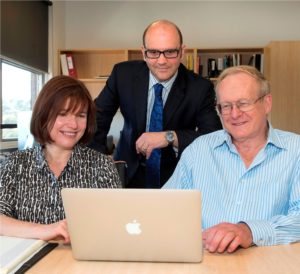
Research data created by Flinders biologist Professor Mike Bull is the first to be stored on the South Australian node of RDSI (Research Data Storage Infrastructure).
RDSI is one of several Federally-funded projects to build eResearch Infrastructure due for completion over the next 18 months.
Mr Grant Jackson from Professor Bull’s team has been working with eResearch@Flinders and eResearchSA to test the new technology and develop procedures to pave the way for the addition of more datasets.
Storage of data in this form, with a description of the dataset, will raise the profile of the Professor Bull’s research and encourage both data reuse and future collaboration.
Professor Richard Constantine, the University’s Pro Vice-Chancellor (Information Services) and Chief Information Officer, said the project is one of several at Flinders engaging with exciting new developments in eResearch.
“We are the first SA University to have added data to RDSI, eResearch@Flinders are developing procedures to describe Flinders created research datasets, and our researchers are involved in a number of NeCTAR-funded Virtual Laboratories, including the Humanities Networked Infrastructure (HuNI),” Professor Constantine said.
(NeCTAR is the National eResearch Collaboration Tools and Resources body.)
“As these projects mature, we’ll be part of a very different eResearch landscape.”
As successful bidders to host both the South Australian nodes of RDSI and the NeCTAR Cloud, and providers of high performance computing services and infrastructure, eResearch SA will be working closely with eResearch@Flinders to ensure that the full range of eResearch services are available to Flinders.
Ms Mary Hobson, Executive Director of eResearch SA, sees the next year as transformative.
“We’ve recently launched the new Tizard supercomputer, the RDSI Node is in pilot stage and the NeCTAR Cloud is to come. By the end of 2013, we’ll be seeing South Australian researchers equipped to deal with data in ways we haven’t seen before,” Ms Hobson said.

